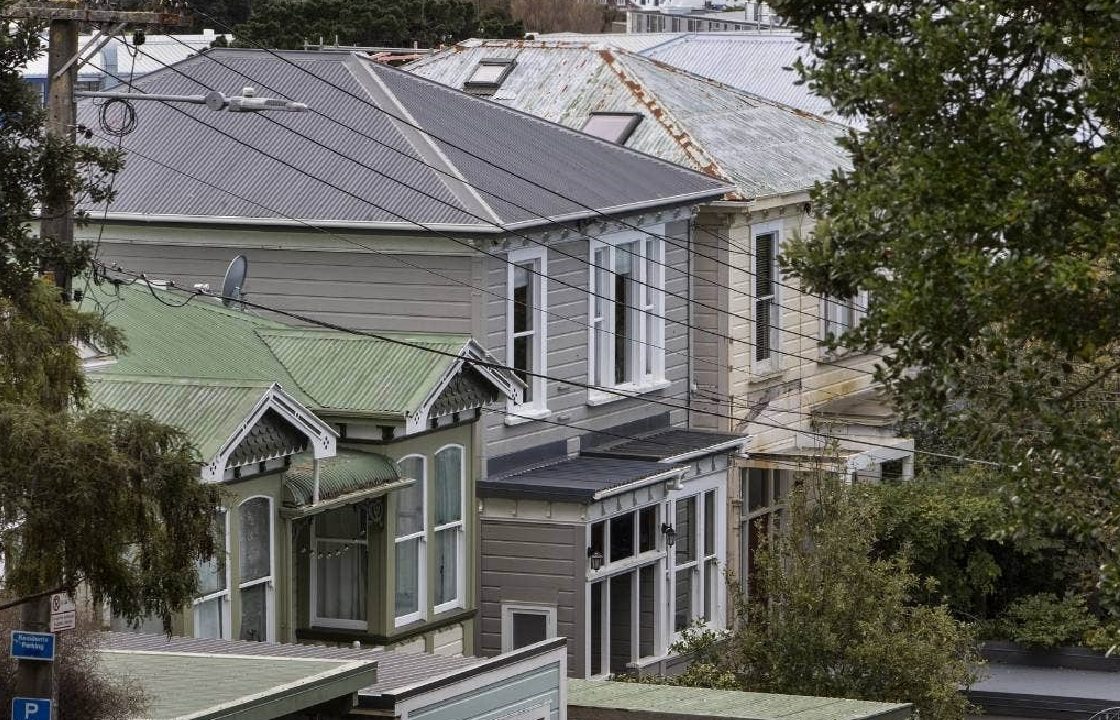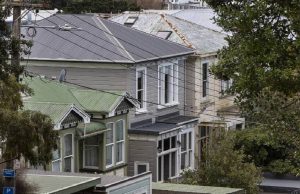
Here’s how much prices have to rise to make buying a better option than renting your house
If house prices were to rise about 5% over the next year it would pay homeowners back for the extra cost of owning their home compared to renting it – at least on paper, BNZ chief economist Mike Jones says.
He said buying a house was “much more expensive” than equivalent rent costs at the moment, and the difference was at one of the highest levels ever.
“Current cash ownership costs for a new purchase have increased to around 50% of average household incomes, compared to around 30% in 2020.
“Rent costs, by comparison, have nudged up to an average 24% of household incomes.”
He said higher costs to buy had been driven by a big increase in mortgage rates and higher house prices over the past five years. Rents had risen, too, but not by as much as debt servicing costs.
Auckland had the biggest difference between the cost of renting and owning. There, 63% of average household incomes were required to buy versus 24% for rent. If renters had savings equal to a 20% house deposit in the bank, the extra interest they could be getting at the moment would reduce the cost of renting further.
But he said that did not mean that renting would be the most cost-effective option over the long term.
”First, inflation tends to deflate the value of borrowers’ debt over time, while rent payments tend to rise with inflation. But more importantly, what happens to house prices ends up being the key swing factor. And no one knows what’s going to happen there.
”For example, the average expense associated with purchasing the median New Zealand home currently exceeds that of renting by just over $38,000 per annum according to our back-of-the-envelope numbers. That’s seemingly a large number to overcome.
“But if house prices were to rise by around 5% over the coming year, this shortfall would be entirely offset by a positive house price revaluation – admittedly a paper ‘gain’ rather than cash. In contrast, if house prices were to go in the other direction it would dramatically increase the shortfall.”
He said those numbers were national level averages and there could be significant variation around the country.
“People often ask the question is it better to buy or rent. The answer tends to depend most on an individual’s person circumstances which are outside the scope. You can quite convincingly say the cash coast of buying much, much higher than renting but no one knows what’s going to happen to house prices and that tends to be what the whole exercise rises or falls upon.”
Forecasts vary as to how much house prices might increase. ANZ expects that house prices could rise 3% through the rest of this year then moderate in 2024. Kiwibank expects house prices to increase by 2% a year by the first quarter of 2024, before hitting a high of 6% by the middle of next year. Westpac expects 8% growth next year and independent economist Tony Alexander said the increase next year could be as high as 10%.
Jones said the data also missed the fact that many people bought for non-financial reasons. “It’s hard to put values in the spreadsheet for things like security of tenure and being able to hang your pictures up or renovate. When it comes down to it, these may well end up being the most important in the decision.”
In the UK, it was reported last month that buying had become more expensive than renting for the first time in 13 years.
In Australia, it has been reported that, in parts of the Gold Coast and Adelaide, it is pricier to rent than own and in the US cities such as New Orleans, Chicago and Memphis have more expensive rental properties.
Jones said it was hard to directly compare countries.
But he said it was hard to go past New Zealand’s stretched house price metrics, and the fact the country had generally higher interest rates over the long term as explanations for the higher cost of owning here.
Gareth Kiernan, chief forecaster at Infometrics, said, using data on property price per square metre, and based on a 100m² city centre apartment and 130m² apartment outside a city centre, it seemed to be cheaper to rent than own a city centre apartment in 21 out of 99 countries. Twelve had lower rents than mortgage costs outside the city centre.
“New Zealand is towards the end of the ‘much cheaper to rent end of the spectrum’, with just Argentina, Hong Kong, South Korea, and Switzerland having a more favourable gap towards renting outside the city centre. Argentina’s result is driven by its economic crisis and very high interest rates, whereas the other three have very high property prices.”

주택 구입과 렌트 비용 비교: 언제 구입이 유리할까?
BNZ 경제학자 마이크 존스는 내년 주택 가격이 약 5% 상승한다면, 주택 소유자들이 렌트와 비교하여 주택 소유에 따른 추가 비용을 지불하게 될 것이라고 말했다. 존스는 현재 주택 구매 비용이 렌트 비용보다 “훨씬 더 비싸다”며 현재 차이가 역사적으로 가장 큰 수준 중 하나라고 설명했다.
그는 새로운 주택 구매의 현금 소유 비용이 평균 가구 소득의 약 50%로 증가했다고 밝혔는데, 이는 2020년에는 약 30%에 불과했다. 대조적으로, 렌트 비용은 가구 소득의 평균 24%로 조금 올랐다고 했다.
구매 비용 상승은 지난 5년 동안 대출 이자율과 주택 가격의 큰 상승으로 이어졌다고 그는 설명하며, 렌트 비용 또한 상승했지만 부채 서비스 비용만큼은 증가하지 않았다고 덧붙였다.
오클랜드는 렌트와 자가 사이의 비용 차이가 가장 큰 곳으로, 여기서는 평균 가구 소득의 63%가 집을 소유하는데 필요하며, 렌트 비용은 24%에 불과하다. 세입자가 은행에 주택 계약금으로 20%를 저축했다면, 현재 이자가 더 높아질 수 있어 렌트 비용이 더욱 줄어들 수 있을 것이다.
하지만 이것이 장기적으로 주택을 렌트하는 것이 더 경제적인 선택이라는 것을 의미하지는 않는다.
그는 “먼저, 인플레이션은 시간이 지남에 따라 대출 채무 가치를 줄이는 경향이 있으며, 렌트 비용은 인플레이션과 함께 상승하는 경향이 있다. 그러나 무엇보다 주택 가격이 어떻게 변화하는지가 결정적인 역할을 한다. 그리고 아무도 그 부분에 대해 예상하기 쉽지 않다”고 그는 강조했다.
그는 이러한 숫자들이 전국적으로 평균 수치이며 지역에 따라 큰 차이가 있을 수 있다고 덧붙였다.
그는 “사람들은 종종 집을 사는 것이 좋은지, 렌트하는 것이 좋은지 묻는다. 나의 대답은 개인의 상황에 따라 다르다. 주택 구매의 현금 비용은 렌트보다 훨씬 높다고 확실히 말할 수 있지만 주택 가격이 어떻게 변할지는 아무도 모르며, 이것이 전체 결정의 핵심이 되기도 한다”라고 그는 말했다.
주택 가격이 얼마나 상승할지에 대한 예측은 다양하다. ANZ는 올해 나머지 기간 동안 주택 가격이 3% 상승할 것으로 예상하고 이후 안정될 것으로 예상한다. Kiwibank는 2024년 첫 분기까지 주택 가격이 연간 2% 상승할 것으로 보고, 내년 중순까지 6%까지 상승할 것으로 예상하고 있다. Westpac은 내년에 8% 성장을 예상하며 경제학자 토니 알렉산더는 내년 주택 상승률이 10%까지 올라갈 수 있다고 말했다.
조너스는 이 데이터가 많은 사람들이 금전적인 이유 외에도 주택을 구매한 사실을 놓치고 있다고 지적했다. “렌트 계약의 안전성과 그림을 걸거나 리모델링할 수 있는 장점과 같은 요소에 대한 스프레드 시트에 가치를 부여하기 어렵다. 그러나 실제로 결정에서 가장 중요할 수도 있다”라고 그는 말했다.
지난 달에 영국에서는 13년 만에 주택구매가 렌트보다 비싸진 첫 번째 경우로 보도되었다.
호주에서는 골드 코스트와 애들레이드 일부 지역에서 렌트보다 주택 소유가 더 비싸다고 보도되었으며, 미국의 뉴 올리언스, 시카고 및 멤피스와 같은 도시에서는 렌트가 더 비싼 지역도 있다.
조너스는 뉴질랜드와 다른 국가들 간의 직접적인 비교는 어렵다고 말했다.
그러나 그는 뉴질랜드의 주택 가격 지표가 길게 늘어져 있으며 장기간에 걸쳐 높은 이자율을 가진 것이 주택 소유 비용을 높게 만든 이유로 설명하기 어렵다고 덧붙였다.
Infometrics의 가레스 키어난은 제곱 미터당 부동산 가격 데이터를 사용하고 도심 100m² 아파트와 도심 외곽 130m² 아파트를 기준으로 하여, 도심 아파트를 소유하는 것이 99개 국가 중 21개 국가에서 렌트하는 것보다 저렴해 보인다고 말했다. 도심 외곽에서는 대출 비용이 더 저렴한 나라가 12개 있었다.
그는 “뉴질랜드는 ‘렌트가 더 저렴하다’라고 말했으며, 아르헨티나, 홍콩, 대한민국 및 스위스도 비슷한 격차가 있는 것으로 나타났다고 덧붙였다. 아르헨티나는 경제 위기와 매우 높은 이자율로 인해 렌트가 저렴고, 다른 세 나라는 매우 높은 부동산 가격 때문이다.” 라고 언급했다.
